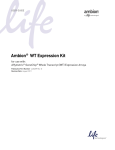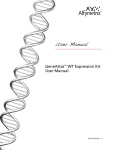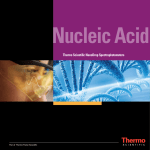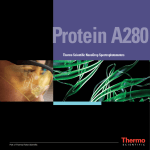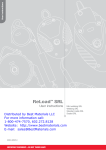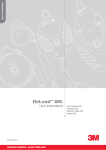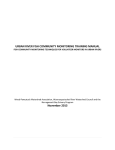Download RNA Control 250 User Guide
Transcript
USER GUIDE RNA Control 250 Publication Part Number 7155M Rev. C Revision Date September 2011 ■ Product description . . . . . . . . . . . . . . . . . . . . . . . . . . . . . . . . . . . . . . . . . . . . . . . . . . . . 1 ■ Product specification . . . . . . . . . . . . . . . . . . . . . . . . . . . . . . . . . . . . . . . . . . . . . . . . . . . 2 ■ Kit contents and storage . . . . . . . . . . . . . . . . . . . . . . . . . . . . . . . . . . . . . . . . . . . . . . . . 2 ■ Required materials . . . . . . . . . . . . . . . . . . . . . . . . . . . . . . . . . . . . . . . . . . . . . . . . . . . . . 3 ■ RNA Control 250 User Procedure . . . . . . . . . . . . . . . . . . . . . . . . . . . . . . . . . . . . . . . . 3 ■ Applications using RNA Control 250 . . . . . . . . . . . . . . . . . . . . . . . . . . . . . . . . . . . . . 5 ■ Troubleshooting . . . . . . . . . . . . . . . . . . . . . . . . . . . . . . . . . . . . . . . . . . . . . . . . . . . . . . . 7 ■ Safety . . . . . . . . . . . . . . . . . . . . . . . . . . . . . . . . . . . . . . . . . . . . . . . . . . . . . . . . . . . . . . . . 8 ■ Documentation and Support . . . . . . . . . . . . . . . . . . . . . . . . . . . . . . . . . . . . . . . . . . . 10 Product description The RNA Control 250 provides a precise, accurate, and reproducible RNA concentration reference for use in conjunction with NanoDrop® Spectrophotometers. The control consists of a single, ultra-pure, 2,002 nt RNA transcript of precisely defined sequence, molecular weight, and concentration. It is packaged in special, non-stick tubes in THE RNA Storage Solution (Part no. AM7000, AM7001). The RNA Control 250 also makes an ideal reference standard for generating RNA concentration standard curves (e.g., for RiboGreen®-based assays) as well as for validating well-to-well concentration accuracy and dilution linearity on the Agilent® 2100 Bioanalyzer™ instrument. To ensure maximum utility of the RNA Control 250 as a reference tool, we recommend that you closely follow the notes in the section “Minimize user-controlled variability” on page 3. Product specification Special handling precautions Product specification Parameter Specification Concentration See accompanying specification sheet Storage Buffer THE RNA Storage Solution† A260/A280 See accompanying specification sheet A260/A230 See accompanying specification sheet A260 See accompanying specification sheet Molecular weight 641,991 Daltons Length 2,002 nt Nucleotide composition A = 452 G = 499 C = 576 U = 475 Extinction coefficient, E260 40 µL/ng-cm † 1 mM sodium citrate, pH 6.4 ± 0.2 Kit contents and storage The kit contains sufficient reagents for 10 measurements of RNA Control 250, 5 measurements from each of the supplied tubes. Product RNA Control 250 THE RNA Storage Solution Amount Storage 2 × 20 µL –20°C 100 µL –20°C For short term storage, store both tubes of RNA Control 250 at –20°C. Do not store in a frost-free freezer. For long-term storage (>6 months), store at –80°C. Special handling precautions • Do not expose each tube of the RNA Control 250 to more than 5 freeze-thaw cycles. • Do not sample from any given tube more than 5 times. • Always use a new pipette tip when sampling from the tube of RNA Control 250. • Do not dilute the RNA Control 250 when measuring with a NanoDrop® Spectrophotometer. 2 RNA Control 250 User Guide Required materials Minimize user-controlled variability Required materials • NanoDrop® Spectrophotometer • Lint-free disposable tissue, for cleaning the spectrophotometer pedestal • Calibrated low-volume pipettor, e.g., P-2 or P-10 • RNase-free Tips (e.g., Part no. AM12635, AM12640) • Nuclease-free Water, for cleaning the spectrophotometer (e.g., Part no. AM9930) • Water bath set to 37°C • (Optional) Reagents and equipment for any other methodology for which you are using the RNA Control 250 as a benchmark, e.g., RiboGreen reagent (Molecular Probes®), NanoDrop® Fluorospectrometer, or Agilent® Bioanalyzer™ instrument. RNA Control 250 User Procedure Note: These instructions assume a working knowledge of NanoDrop® Spectrophotometers. Refer to the NanoDrop® User’s Manual available at www.nanodrop.com for detailed instructions on the instrument’s use. Minimize usercontrolled variability User-controlled factors can adversely affect both measurement accuracy and reproducibility when using the RNA Control 250. To achieve maximally reproducible and accurate concentration readings with the RNA Control 250 (±5%), use these best practices: • Do not expose each tube of RNA Control 250 to more than 5 freeze-thaw cycles. • Do not dilute the RNA Control 250. • Do not sample from the same tube of RNA Control 250 more than 5 times (sampling the RNA Control 250 tube too many times can result in excess sample evaporation; each tube supplies an excess of RNA Control 250 to minimize the effects of evaporation during sampling). • Thaw, mix, and handle the RNA Control 250 according to the protocol, to maintain its integrity and concentration. • Use a properly calibrated pipette. • Always measure the RNA Control 250 using a 2 µL assay volume. Although NanoDrop® Spectrophotometer measurements are generally volumeindependent for samples of 1–2 µL, in our experience, accuracy and reproducibility are greatest when using a 2 µL aliquot. • Measure the RNA concentration on the NanoDrop® Spectrophotometer sample pedestal immediately after dispensing (within 10 seconds). If measurement is delayed, sample evaporation after loading the sample pedestal can reduce accuracy. • Measure duplicate samples, to give the most accurate measurement of the RNA Control 250. • Use a properly calibrated spectrophotometer. RNA Control 250 User Guide 3 RNA Control 250 User Procedure Begin the procedure Begin the procedure 1. Thaw the RNA Control 250 at 37°C for 5 min. a. Prior to use, remove the RNA Control 250 from the -20°C freezer and thaw the RNA solution by incubating the tube at 37°C in a water bath for exactly 5 min—set a timer. IMPORTANT! Thawing times >5 min can lead to decreased transcript integrity over time. We recommend using a water bath to thaw the RNA Control 250, because its packaging tube requires a water bath’s efficient heat transfer to thaw the RNA Control 250 within 5 min. b. After thawing for exactly 5 min, remove the tube of RNA Control 250 from the water bath and vortex vigorously for 10 seconds. c. Centrifuge the tube of RNA Control 250 for 30 seconds at ~2,300 × g (5,000 rpm) in a microcentrifuge to collect the liquid at the bottom of the tube. d. Store the RNA Control 250 at room temperature while you proceed immediately to step 2. 2. Prepare the NanoDrop® Spectrophotometer for spectral measurements. a. Raise the sampling arm of the spectrophotometer and clean the lower and upper sample pedestals by rinsing with nuclease-free water, as recommended by the manufacturer. Wipe off any excess water with a lintfree, disposable tissue. b. Launch the NanoDrop® Spectrophotometer program to initiate the measurement software as described in the User’s Manual. The main application window will appear. c. Raise the sampling arm and, using a calibrated P-2 or P-10 pipette, transfer 2.0 µL of nuclease-free water to the lower sample pedestal. Click “OK” to initialize the spectrophotometer. d. After initialization, select RNA-40 as the sample type. e. Raise the sample arm and dry the water from both the lower and upper sample pedestals with a lint-free, disposable tissue. f. Transfer 2.0 µL of THE RNA Storage Solution to the lower sample pedestal, then lower the sampling arm. Blank the spectrophotometer. g. Raise the sampling arm and wipe off any buffer from the top and bottom pedestals with a lint-free disposable tissue. h. Transfer a new 2.0 µL aliquot of THE RNA Storage Solution to the lower sample pedestal, lower the sampling arm, and measure the solution. i. The baseline spectrum should be flat and the A260 should indicate an RNA concentration less than ±2 ng/µL. If not, repeat steps f–h until this is achieved. 3. Measure the concentration of the RNA Control 250 in duplicate. a. Thoroughly mix the thawed RNA Control 250 by pipetting up and down several times immediately before sampling. b. Transfer 2.0 µL of the RNA Control 250 to the lower sample pedestal with a clean pipette tip. 4 RNA Control 250 User Guide Applications using RNA Control 250 Verify performance of NanoDrop® Spectrophotometer c. Quickly lower the sampling arm and immediately measure the concentration of the sample. Note: After the RNA Control 250 is placed on the instrument, measure the sample quickly (within 10 seconds) to offset potential sample evaporation. Excess evaporation can lead to reduced measurement accuracy d. Record the sample concentration. The expected value is listed on the specification sheet accompanying the product. e. Raise the sampling arm and wipe off any solution from the top and bottom pedestals with a lint-free disposable tissue. f. Measure a second aliquot of RNA Control 250 using the same procedure. Applications using RNA Control 250 Verify performance of NanoDrop® Spectrophotometer RNA Control 250 was designed for verifying performance of NanoDrop® Spectrophotometers with the sample type most commonly measured on the instrument. This highly defined and precisely controlled RNA product can ensure the user of run-to-run accuracy and measurement reproducibility when used on NanoDrop® Spectrophotometers following the procedures in this protocol. To illustrate this, triplicate aliquots of RNA Control 250 were measured on 12 different NanoDrop® spectrophotometers (Figure 1). Measurements fell within 5% of the mean concentration value for this lot of RNA Control 250. Generate accurate RNA concentration standard curves The RNA Control 250 makes an ideal reference standard for generating concentration standard curves using RiboGreen® reagent, such as shown in Figure 2 on page 6. Figure 1 Reproducibility of RNA Control 250 measurements. Bars represent the average of triplicate samples of RNA Control 250, measured on 12 different NanoDrop spectrophotometers. The mean concentration for this lot of RNA Control 250 was 256 ng/µL. 280 270 ng/µl 260 250 240 230 220 210 200 1 2 3 4 5 6 7 8 Instrument Number 9 10 11 12 Note that the accuracy and linearity of any RNA concentration standard curve depends not only on the accuracy of the RNA reference standard used for making the serial dilutions, but also on the accuracy and precision of the pipette used to make the dilutions. RNA Control 250 User Guide 5 Applications using RNA Control 250 Generate accurate RNA concentration standard curves Fluorescence Figure 2 RNA Control 250 concentration curve. A standard generated using RNA Control 250 and measured using RiboGreen® Reagent (Molecular Probes, Cat #R11491) on a NanoDrop ND3300 Fluorospectrometer. 1800 1600 1400 1200 1000 800 600 400 200 0 R2=0.997 0 15 30 45 ng per reaction 60 75 Figure 3 RNA Control 250 on the Agilent® 2100 Bioanalyzer™ instrument. Triplicate samples of a dilution series of RNA Control 250 were analyzed on three different Agilent 2100 Bioanalyzer™ instruments using an RNA LabChip® Kit. Panel A: Gel-like images from one Bioanalyzer™ instrument. Indicated concentrations were calculated from NanoDrop® measurements. The Ambion RNA 6000 Ladder (Part no. AM7152) is shown at left. Panel B: Mean concentrations derived from area-under-curve (AUC) measurements of triplicate samples on each Bioanalyzer™ instrument. For comparison, the benchmark concentration values based on NanoDrop measurements are shown. The AUC measurements decrease linearly with dilution, however Life Technologies routinely observes that RNA concentrations derived from Bioanalyzer™ instrument AUC measurements are higher than benchmark concentrations determined by NanoDrop® measurements. — 2002 nt ng/µL ng/µL 250 125 62.5 31.25 450 400 350 300 250 200 150 100 50 0 bioanalyzer #1 bioanalyzer #2 bioanalyzer #3 NanoDrop® 1:1 1:2 1:4 1:8 Dilution 6 RNA Control 250 User Guide Troubleshooting Confirm well-to-well reproducibility using the Agilent 2100 Bioanalyzer™ instrument Confirm well-towell reproducibility using the Agilent 2100 Bioanalyzer™ instrument The RNA Control 250 is also ideal for validating well-to-well reproducibility and dilution linearity on the Agilent 2100 Bioanalyzer™ instrument (Figure 3 on page 6). Triplicate samples of a dilution series of RNA Control 250 were analyzed on three different Agilent 2100 Bioanalyzer™ instruments. Panel A shows the gel-like images from one Bioanalyzer™ instrument, along with the indicated benchmark concentrations determined by NanoDrop® measurements. Panel B shows the mean concentrations derived from area-under-curve (AUC) measurements on each Bioanalyzer™ instrument compared to the benchmark values. Troubleshooting Observation RNA concentration measured on the NanoDrop® spectrophotometer is outside specifications. A260/A280 or A260/A230 ratios are outside specifications RNA Control 250 is degraded RNA Control 250 User Guide Possible cause Recommended action Air bubbles formed in the RNA solution during placement of the sample on the lower pedestal. Remove air bubbles and repeat the assay. RNA was not properly thawed and resuspended. Carefully repeat thaw procedure at 37°C, using a water bath to thaw the RNA (step 1 on page 4). Pipettor (P-10) is not properly calibrated; assay volumes <1.5 µL can increase measurement variability. Use a properly calibrated pipettor to make sure that a 2 µL sample is evaluated in the assay. Sample pedestal was not properly rinsed and cleaned before use. Clean the sample pedestal with nucleasefree water and repeat the assay. Spectrophotometer was not properly blanked. Reblank the spectrophotometer as described in step 2 on page 4. Spectrophotometer is outside normal calibration parameters. Recalibrate the spectrophotometer according to manufacturer’s recommendations. Dust or other particles on sample pedestal cause light scattering. Clean sample pedestal using nucleasefree water and lint-free disposable tissues. Spectrophotometer is not accurately calibrated. Recalibrate spectrophotometer according to the manufacturer’s recommendations. RNA Control 250 has been thawed under elevated temperatures and/ or for extended periods of time. Minimize exposure to elevated temperatures and prolonged thawing. RNA Control 250 has been contaminated with exogenous ribonucleases. Use gloves and RNase-free tips. Never reuse RNA Control 250 after it has been placed on the pedestal because the pedestal is not RNase-free. 7 Troubleshooting Biological hazard safety Appendix A Safety WARNING! GENERAL SAFETY. Using this product in a manner not specified in the user documentation may result in personal injury. Ensure that anyone using this product has received instructions in general safety practices for laboratories and the safety information provided in this document. • Before using an instrument or device, read and understand the safety information provided in the user documentation provided by the manufacturer of the instrument or device. • Before handling chemicals, read and understand all applicable Safety Data Sheets (SDSs) and use appropriate personal protective equipment (gloves, gowns, eye protection, etc). To obtain SDSs, see the “Documentation and Support” section in this document. Biological hazard safety WARNING! Potential Biohazard. Depending on the samples used on this instrument, the surface may be considered a biohazard. Use appropriate decontamination methods when working with biohazards. WARNING! BIOHAZARD. Biological samples such as tissues, body fluids, infectious agents, and blood of humans and other animals have the potential to transmit infectious diseases. Follow all applicable local, state/provincial, and/or national regulations. Wear appropriate protective equipment, which includes but is not limited to: protective eyewear, face shield, clothing/lab coat, and gloves. All work should be conducted in properly equipped facilities using the appropriate safety equipment (for example, physical containment devices). Individuals should be trained according to applicable regulatory and company/ institution requirements before working with potentially infectious materials. Read and follow the applicable guidelines and/or regulatory requirements in the following: In the U.S.: • U.S. Department of Health and Human Services guidelines published in Biosafety in Microbiological and Biomedical Laboratories found at: www.cdc.gov/biosafety • Occupational Safety and Health Standards, Bloodborne Pathogens (29 CFR§1910.1030), found at: www.access.gpo.gov/nara/cfr/waisidx_01/ 29cfr1910a_01.html • Your company’s/institution’s Biosafety Program protocols for working with/ handling potentially infectious materials. • Additional information about biohazard guidelines is available at: www.cdc.gov In the EU: Check local guidelines and legislation on biohazard and biosafety precaution and refer to the best practices published in the World Health Organization (WHO) Laboratory Biosafety Manual, third edition, found at: www.who.int/ csr/resources/publications/biosafety/WHO_CDS_CSR_LYO_2004_11/en/ 8 RNA Control 250 User Guide Troubleshooting Chemical safety Chemical safety RNA Control 250 User Guide WARNING! GENERAL CHEMICAL HANDLING. To minimize hazards, ensure laboratory personnel read and practice the general safety guidelines for chemical usage, storage, and waste provided below, and consult the relevant SDS for specific precautions and instructions: • Read and understand the Safety Data Sheets (SDSs) provided by the chemical manufacturer before you store, handle, or work with any chemicals or hazardous materials. To obtain SDSs, see the “Documentation and Support” section in this document. • Minimize contact with chemicals. Wear appropriate personal protective equipment when handling chemicals (for example, safety glasses, gloves, or protective clothing). • Minimize the inhalation of chemicals. Do not leave chemical containers open. Use only with adequate ventilation (for example, fume hood). • Check regularly for chemical leaks or spills. If a leak or spill occurs, follow the manufacturer's cleanup procedures as recommended in the SDS. • Handle chemical wastes in a fume hood. • Ensure use of primary and secondary waste containers. (A primary waste container holds the immediate waste. A secondary container contains spills or leaks from the primary container. Both containers must be compatible with the waste material and meet federal, state, and local requirements for container storage.) • After emptying a waste container, seal it with the cap provided. • Characterize (by analysis if necessary) the waste generated by the particular applications, reagents, and substrates used in your laboratory. • Ensure that the waste is stored, transferred, transported, and disposed of according to all local, state/provincial, and/or national regulations. • IMPORTANT! Radioactive or biohazardous materials may require special handling, and disposal limitations may apply. 9 Documentation and Support Obtaining SDSs Documentation and Support Obtaining SDSs Safety Data Sheets (SDSs) are available from www.lifetechnologies.com/sds Note: For the SDSs of chemicals not distributed by Life Technologies, contact the chemical manufacturer. Obtaining support For the latest services and support information for all locations, go to: www.lifetechnologies.com At the website, you can: • Access worldwide telephone and fax numbers to contact Technical Support and Sales facilities • Search through frequently asked questions (FAQs) • Submit a question directly to Technical Support • Search for user documents, SDSs, vector maps and sequences, application notes, formulations, handbooks, certificates of analysis, citations, and other product support documents • Obtain information about customer training • Download software updates and patches 10 RNA Control 250 User Guide Documentation and Support Obtaining support RNA Control 250 User Guide 11 For Research Use Only. Not intended for any animal or human therapeutic or diagnostic use. Limited Use Label License: Research Use Only The purchase of this product conveys to the purchaser the limited, non-transferable right to use the purchased amount of the product only to perform internal research for the sole benefit of the purchaser. No right to resell this product or any of its components is conveyed expressly, by implication, or by estoppel. This product is for internal research purposes only and is not for use in commercial applications of any kind, including, without limitation, quality control and commercial services such as reporting the results of purchaser’s activities for a fee or other form of consideration. For information on obtaining additional rights, please contact [email protected] or Out Licensing, Life Technologies, 5791 Van Allen Way, Carlsbad, California 92008 © 2011 Life Technologies Corporation. All rights reserved. The trademarks mentioned herein are the property of Life Technologies Corporation or their respective owners. Bioanalyzer is a trademark of Agilent Technologies, Inc. NanoDrop is a registered trademark of NanoDrop Technologies, LLC. Headquarters 5791 Van Allen Way | Carlsbad, CA 92008 USA Phone +1 760 603 7200 | Toll Free in USA 800 955 6288 For support visit www.appliedbiosystems.com/support www.lifetechnologies.com













